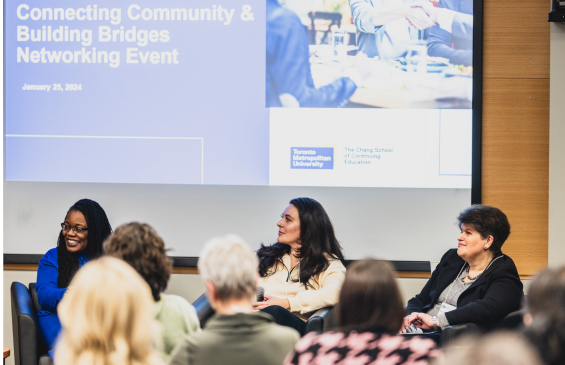Networking at Various Stages of Your Career

From left to right: Junie Facey, Sheena Sheridan, and Krista Slade at the “Connecting Community and Building Bridges” event in January 2024.
February 20, 2024
You’ve probably heard of the saying, “It’s not what you know, it’s who you know” when it comes to getting a job or promotion. But networking could look different depending on the stage of your career, a theme that was explored at an exclusive, in-person networking event held at The Chang School in January.
The event featured a panel discussion with three professionals in the charitable and nonprofit sectors: Junie Facey, who has over 25 years of experience working in nonprofit in a variety of leadership and governance roles, and sectors, as well as 13 years as a Chang School Instructor; Sheena Sheridan, who has over a decade of experience working as an advocate for underserved populations who are systematically oppressed; and Krista Slade, who has over 25 years of experience in philanthropy, strategic partnerships, and international association management.
For instance, someone who’s looking to land their first job is likely looking for help, introductions, and advice on where to start, whereas someone mid-career is often looking to build on certain skill sets or get a promotion through volunteering or training.
So whether you’re starting out or looking to move up to management, it’s important to build and maintain those connections throughout your career – and not just when you are job searching or looking for help.
Starting Out
Early on in your career, building a network starts with everyone you know – family, friends, professors, and managers from previous jobs or internships. Ask these people for help, introductions, and advice – you just need to get your name out there.
However, while this may be a good strategy in the beginning, as you advance in your career and are looking for your first promotion, it could be useful to look outside your existing network of family and friends for other professionals who might have different perspectives.
“Sometimes having someone who has a little more distance can help you objectively work through decisions you have to make,” said Krista. “Maybe that’s an academic or work mentor – people who have a diversity of experience and are willing to give you some frank feedback and ask you some really good questions.”
Getting Your First Promotion
Once you’re in your role, gaining visibility and building skills sets you need to get promoted is key. This can be accomplished through volunteering for committees with diverse employees across the company, including those working in decision-making positions. Or you could also volunteer with not-for-profit companies to acquire those skills.
During this time, you might also want to consider taking advantage of any in-house training opportunities or seeking training externally at a post secondary institution. Use these opportunities to build your network and learn more about your industry and salary ranges.
Moving Into Leadership Roles
Building a strong network is key if you want to move into management or leadership positions. This is where it’s key to strategically network with people who are outside of your organization, like recruiters and influencers in your industry.
This is especially important if you want to change industries or create your own job so you get access to the best information, ideas, funding, and the right people.
As Sheena puts it, the days of thinking of a career as a linear entity are gone.
“There’s a generation that has a linear way of thinking – you finish high school, you pick a career, and then you stick with it whether you’re happy, whether you don’t like it, you find something with a pension and benefits and that’s what you do, because that’s the right way of doing things,” said Sheena.
“When I switched career paths or pursued education in different fields under the same umbrella, my parents were looking at me and saying, ‘Can you just stick with one thing?’”
“You ultimately just have to be happy. You have to pick something that you’re happy with. That doesn’t mean always sticking with the same thing,” she advised.
Networking can also help you find a mentor, which is a positive outcome of investing time in building your professional network.
Connecting With Mentors
At the networking event, the panelists also talked about how to find a mentor, and what it means to be one. It was stressed that mentorship can be a critical part of networking throughout the various stages of one’s career.
“[(Mentorship]) is a relationship,” said Junie. “While you’re giving you’re also receiving – it’s valuable to watch someone develop through your interactions with them.”
Krista also likened mentorship to an ongoing relationship.
“Don’t only come to them when you need something,” said Krista. “Try to be generous with your time. Keep it authentic with those relationships. You want that reciprocity.”
“I look back on the mentors in my life and there are people who I’ve known for 30 years – some of whom are very elderly now, but they’re wise people,” Krista adds. “I’ve worked very hard to keep in touch with them.”
Both mentorship and networking take hard work – they’re not activities you do for a short time to get your dream job or a promotion to advance your career. There’s something to be said for making genuine connections in your industry, which can not only help you grow professionally but allow you to share your knowledge and experience with others to help them with their career goals.
Learn more about the Certificate in Fundraising Management
Learn more about the Certificate Nonprofit and Voluntary Sector Management
Learn more about the Certificate in Community Engagement, Leadership, and Development
